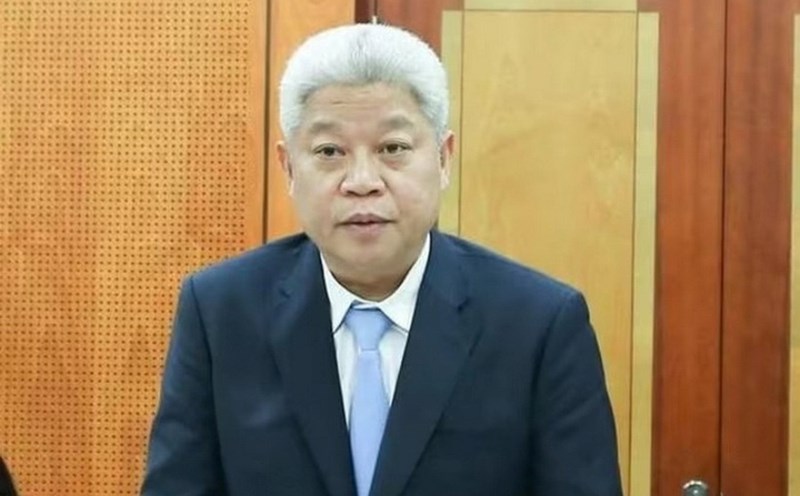" Breathless" with land use fees when converting purposes
The new regulations currently require households and individuals when converting land from agricultural land to residential land to be subject to 100% of the land price in the land price list for the entire area, regardless of whether the land is within or outside the limit. While localities are currently issuing land price lists that are too high because they have integrated the land price adjustment coefficient (coefficient K) into the land price list. Typically, in Ho Chi Minh City, the land price list has increased from 3 to more than 38 times compared to before.
This is really putting great pressure on people when the total amount of money people have to pay is too high, far beyond financial capacity. Typically, a 20.0 m2 plot of land in Hoc Mon district (old) when converting its purpose to residential land must pay 1.7 billion VND or a 400 m2 plot in District 7 (old) must pay up to 14 billion VND.
Mr. Viet Doan, residing in Binh Trung Ward, said that he has a 210 m2 plot of land that is eligible for a resettlement in Long Binh Ward, Ho Chi Minh City but is stuck in planning. When the obstacles were removed, he learned about the procedures for dividing the plot and changing the purpose and was very "shocked" because he had to pay more than 5.7 billion VND in land use fees, beyond his ability to pay.
It is known that according to the current land price list, deep alley land on the main road in this area such as Nguyen Xien street is priced at 28 million VND/m2, while agricultural land is only about 600,000 VND, a difference of more than 27 million VND/m2, causing conversion costs to increase by more than 10 times. Previously, the land price in this area was only 2.7 million VND/m2.
Mr. Viet Doan said that he is temporarily suspending the change of purpose to wait for the adjustment of the land price list or to reduce the collection rate more appropriately. Because currently collecting 100% of land regardless of whether it is within or outside the limit is too high and unreasonable.
Reasonable reduction is needed for people
The Ho Chi Minh City Real Estate Association (HoREA) said that the city currently has more than 13,000 plots of land that have not been granted certificates, accounting for 0.7% of the total number of plots in the area. In particular, households and individuals with houses and land in planning, not yet converted to use purpose, or wanting to legalize the right to use agricultural land areas interspersed in residential areas with stable access to existing housing are all facing difficulties when land prices increase and conversion costs fluctuate strongly.
It is known that the Ministry of Finance is drafting a Government Resolution to remove difficulties and handle problems related to calculating land use fees for households and individuals when converting agricultural land use purposes to residential land.
According to the draft, for land areas within the residential land allocation limit, the minimum collection rate is 30% of land use fees. If the area exceeds the residential land allocation limit, the collection rate will be higher: at least 50% for the area exceeding the limit but not exceeding 500m2; and 100% for the area exceeding 500m2.
Notably, this fee only applies once for each household and individual. From the next change of purpose, the calculation of land use fees will be based on general regulations in the Government's Decree on land use fees and land rents.
Regarding the regulation on land use fee collection, Mr. Le Hoang Chau, Chairman of the Ho Chi Minh City Real Estate Association (HoREA), suggested that it should be adjusted down the direction compared to the draft. Specifically, Mr. Chau proposed that the collection rate for land areas within the residential land allocation limit should only be at 20% of land use fees, and for areas exceeding the residential land allocation limit to 30%, instead of 30% and 50% as in the current draft.
Mr. Chau expressed his opinion that with a rate of 20 - 30%, it will not only reduce financial pressure, but also bring synchronization in the application process nationwide. This will help localities more conveniently implement, while ensuring " fairness and reasonable accommodation".
In addition, Mr. Le Hoang Chau also made an important recommendation that of considering exemption of land use fees for the area of land use conversion within the residential land allocation limit. The reason is that many households in both rural and urban areas, especially in rural areas, have inherited residential land that has been available for many generations. On the same plot of land, there are often houses with gardens, ponds, cages or perennial trees, maintained and passed down through many generations. The exemption of financial obligations for this group of subjects, according to him, will be both practical and have a humanitarian meaning, supporting people to preserve family traditional land funds.










